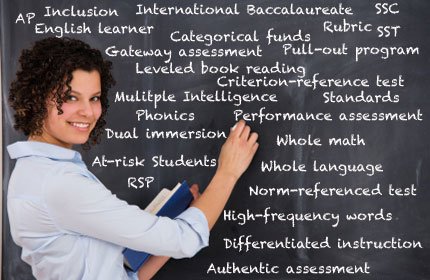“Edu-speak” is a disease that undermines efforts to improve U.S. schools
Time to take a stand against confusing acronyms and overused jargon in education.

I was taking notes during one of those tedious but important school board meetings rookie reporters are assigned to cover when I realized I had no idea what was going on. Board members and various school officials spouted an inaccessible language of acronyms. The board members spent hours talking to and over one another, using terms that must have baffled audience members. I later learned they were discussing raising property taxes to boost the school budget, a critical issue local voters and parents needed to understand.
This was more than 25 years ago and I’ve been determined to eradicate jargon ever since. For education journalists, though, cutting through the argle bargle is a full-time job that distracts from what we should actually be doing: telling stories about how children are faring in American classrooms. I’m more convinced than ever that we can’t improve U.S. education until we figure out how to talk and write clearly about it. I despair each time I get yet another impossible-to-decipher research report or press release, and cringe when educators using phrases like “human capital” and “value propositions,” not to mention those endless acronyms: RTI, PLC, SLT, IEP, PD and LMS.
I’ve ranted about this before, but now I’m determined to fight back, and I’m urging all journalists who cover education to do the same. In the name of public service, let’s agree to stop abetting the school establishment’s “edu-speak.” Stop passing along empty buzzwords and clichés. Let’s finally make the conversation about challenges and solutions accessible to all. (For a look at how to apply a solutions approach to education journalism, see the Education Reporter’s Toolkit, something many of us at The Hechinger Report contributed to)
Why do we need terms like “value-added,” or “formative assessments?” Ugh. Must we really be “intentional” or “empowering” when we talk about education? And can we please stop using “silver bullet” — a cliché you’ve heard as often as the assertion by everyone in education that they, unlike everyone else, put “children first.”
Don’t get me started on overused phrases like “grit” and “rigor,” along with “21st century skills” or “researched-based programs” that educate “the whole child.” As opposed to only half of a child? And what of charter-school movement lingo, replete with “restorative “Edu-speak” is a disease that undermines efforts to improve U.S. schools - The Hechinger Report:
